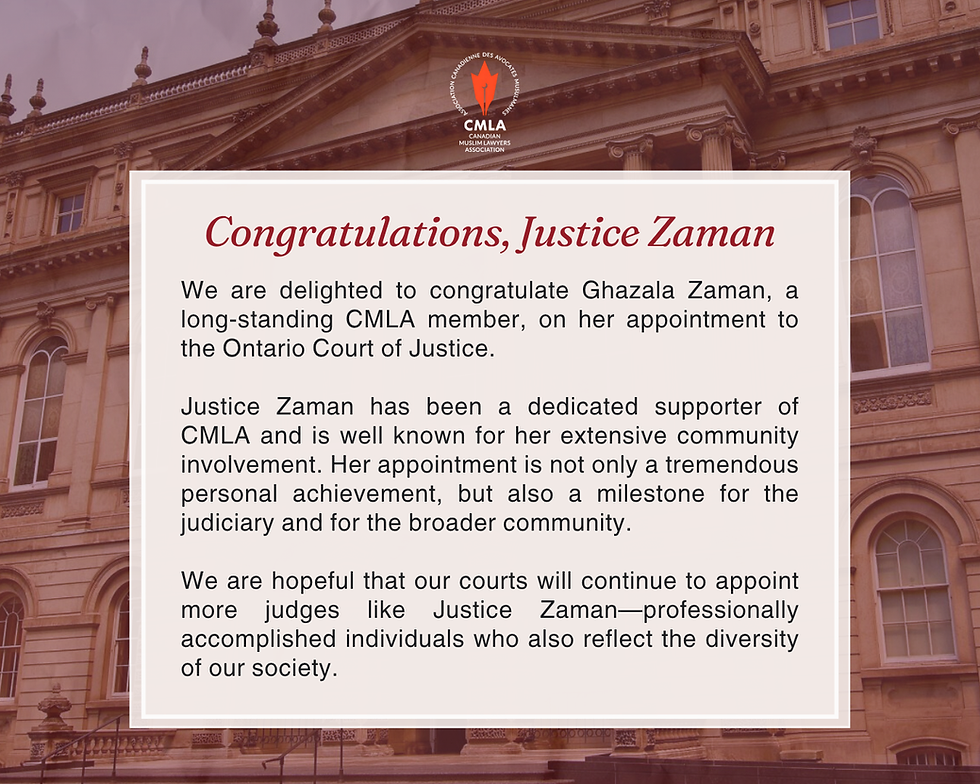PRESS RELEASE: Supreme Court Unanimously Affirms Correct Test for Discrimination
- CMLA
- Jul 24, 2015
- 3 min read
“There is a silver lining in yesterday’s decision from the Supreme Court of Canada,” says Faisal Mirza, the head of advocacy with the Canadian Muslim Lawyers Association (CMLA). “While dismissing the Commission’s appeal, the Supreme Court accepted the essence of the CMLA legal arguments and advanced the state of the law in favor of future victims of discrimination. In particular, the Court upheld that discriminatory conduct may be based on unconscious bias and that a private Canadian company cannot blindly comply with discriminatory decisions by a foreign authority without exposing itself to liability under the Quebec Charter and likely other human rights laws across Canada.”
The CMLA, a non-profit association representing Muslim lawyers across Canada, had intervened jointly with the National Council of Canadian Muslims in the case of Quebec (Commission des droits de la personne et des droits de la jeunesse) v. Bombardier Inc. (Bombardier Aerospace Training Center). The Supreme Court’s decision was released yesterday.
This case was the first opportunity for the Supreme Court to consider allegations of discrimination based on the decision of a foreign authority. In this case, Bombardier refused to provide continuing pilot training to Canadian citizen and established pilot, Mr. Javed Latif, on the basis of a decision by the United States Department of Justice (DOJ) that he was a threat to national security. Mr. Latif argued that the DOJ’s decision to deny him training in Dallas was the result of racial profiling due to his national and ethnic background as a Pakistani Muslim, that Bombardier discriminated against him by relying on the U.S. decision and that he should be able to take pilot training at Bombardier’s Montreal facility since he was not considered a national security threat by Canada. He argued that the discrimination rendered him unemployable in his chosen profession until the United States withdrew the security threat designation some years later, possibly on the basis that they had made a mistake. Mr. Latif was not provided an explanation for the reversal.
In a unanimous decision, the Supreme Court overruled the test adopted by the Quebec Court of Appeal, finding that Latif did not need to establish a “causal connection” between his national origin or ethnicity and his exclusion by the DOJ, but only that these were “factors” in the DOJ’s decision. According to the Court, Mr. Latif did not present enough evidence to prove this on a balance of a probabilities.
“Despite the personal loss for Mr. Latif, the decision affirms that Canadians will be in a stronger position to challenge discrimination,” says Zaid Sayeed, Chair of the CMLA, “We are pleased the Supreme Court accepted the essence of our argument – that the threshold test for a finding of discrimination is and should remain reasonable and realistic.”
The CMLA intervened in this case to advance anti-discrimination law and provide the Court with the critical context of anti-Muslim discrimination. Mr. Latif’s courage and the appellant’s efforts in bringing this case before the Supreme Court of Canada should be lauded, as they led to the advancement of anti-discrimination law to the benefit of all Canadians.
Founded in 1998, the CMLA is a non-profit association of Muslim lawyers from all Canadian provinces and territories and is committed to advancing the law in service of Canadians.
If you would like more information or to schedule an interview with Faisal Mirza, please contact him at fm@mirzakwok.com
You can read the decision in its entirety here.



Comments